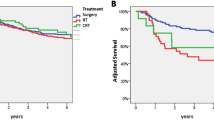Abstract
The aim of the study is to analyze the relationship between the degree of response to induction chemotherapy and the disease control in patients with locally advanced laryngeal carcinomas candidates to total laryngectomy. This retrospective study includes 389 patients with T3–T4 laryngeal tumors candidates to total laryngectomy, diagnosed between 1985 and 2013, treated with induction chemotherapy in an organ preservation protocol. Five-year local recurrence-free survival for patients receiving conservative treatment with radiotherapy after a complete response to induction chemotherapy was 75.4%; for patients with partial response greater than 50%, it was 62.0%; and for patients with the absence of response, it was 32.7%. There were significant differences in local recurrence-free survival and laryngeal dysfunction-free survival according to the response to induction chemotherapy (P = 0.0001) at the expense of patients with absence of response to induction chemotherapy. Patients with partial response greater than 50% treated with radiotherapy had a tendency to have worse local recurrence-free survival and laryngeal dysfunction-free survival than patients with complete response, but the differences did not reach statistical significance. Patients with the absence of response after induction chemotherapy had significant differences in disease-specific survival according to the second treatment: for patients treated with surgery it was 70.2%, whereas for patients treated with radiotherapy, it was 28.2% (P = 0.0001). In patients with the absence of response to induction chemotherapy, conservative treatment with radiotherapy implies a significant decrease in survival.



Similar content being viewed by others
References
The Department of Veterans Affairs Laryngeal Cancer Study Group (1991) Induction chemotherapy plus radiation compared with surgery plus radiation in patients with advanced laryngeal cancer. N Engl J Med 324:1685–1690.
de Andrés L, Brunet J, López-Pousa A, Burgués J, Quer M, León X, Guedea F, Vega M, Mesía R, López JJ (1995) Function preservation in stage III squamous laryngeal carcinoma: results with an induction chemotherapy protocol. Laryngoscope 105:822–826
Lefebvre JL, Chevalier D, Luboinski B, Kirkpatrick A, Collette L, Sahmoud T (1996) Larynx preservation in pyriform sinus cancer: preliminary results of a European Organization for Research and Treatment of Cancer phase III trial. EORTC Head and Neck Cancer Cooperative Group. J Natl Cancer Inst 88:890–899
Richard JM, Sancho-Garnier H, Pessey JJ, Luboinski B, Lefebvre JL, Dehesdin D, Stromboni-Luboinski M, Hill C (1998) Randomized trial of induction chemotherapy in larynx carcinoma. Oral Oncol 34:224–228
Forastiere AA, Goepfert H, Maor M et al (2003) Concurrent chemotherapy and radiotherapy for organ preservation in advanced laryngeal cancer. N Engl J Med 349:2091–2098
Urba S, Wolf G, Eisbruch A, Worden F, Lee J, Bradford C, Teknos T, Chepeha D, Prince M, Hogikyan N, Taylor J (2006) Single-cycle induction chemotherapy selects patients with advanced laryngeal cancer for combined chemoradiation: a new treatment paradigm. J Clin Oncol 24:593–598
Majem M, Mesia R, Mañós M, Gomez J, Galiana R, Cardenal F, Juan A, Montes A, Perez FJ, Nogues J, Llluch JR (2006) Does induction chemotherapy still have a role in larynx preservation strategies? The experience of Institut Catala d’Oncologia in stage III larynx carcinoma. Laryngoscope 116:1651–1656
Lefebvre JL, Rolland F, Tesselaar M et al (2009) Phase 3 randomized trial on larynx preservation comparing sequential vs alternating chemotherapy and radiotherapy. J Natl Cancer Inst 101:142–152
Pointreau Y, Garaud P, Chapet S et al (2009) Randomized trial of induction chemotherapy with cisplatin and 5-fluorouracil with or without docetaxel for larynx preservation. J Natl Cancer Inst 101:498–506
Lefebvre JL, Pointreau Y, Rolland F et al (2013) Induction chemotherapy followed by either chemoradiotherapy or bioradiotherapy for larynx preservation: the TREMPLIN randomized phase II study. J Clin Oncol 31:853–859
Gorphe P, Matias M, Blanchard P, Even C, Ferte C, Tao Y, Temam S, Bidault F, Janot F (2016) Outcomes following laryngectomy refusal after insufficient response to induction chemotherapy. Laryngoscope/bib [Epub ahead of print].
León X, López-Pousa A, de Vega M, Orús C, de Juan M, Quer M (2005) Results of an organ preservation protocol with induction chemotherapy and radiotherapy in patients with locally advanced laryngeal carcinoma. Eur Arch Otorhinolaryngol 262:93–98
León X, Orús C, Quer M (2002) Diseño, mantenimiento y explotación de una base de datos oncológica para pacientes con tumores malignos de cabeza y cuello. Acta Otorrinolaringol Esp 53:185–190
Lefebvre JL, Ang KK (2009) Larynx Preservation Consensus Panel. Larynx preservation clinical trial design: key issues and recommendations-a consensus panel summary. Head Neck 31:429–441
Author information
Authors and Affiliations
Corresponding author
Ethics declarations
Conflict of interest
The authors declare that they have no conflict of interest.
Funding
This study was supported by a Grant from the Instituto de Salud Carlos III (FIS PI14/01918). Fondo Europeo de Desarrollo Regional (FEDER), A Way to Build Europe.
Rights and permissions
About this article
Cite this article
León, X., Valero, C., Rovira, C. et al. Relationship between response to induction chemotherapy and disease control in patients with advanced laryngeal carcinoma included in an organ preservation protocol. Eur Arch Otorhinolaryngol 274, 2581–2587 (2017). https://doi.org/10.1007/s00405-017-4548-1
Received:
Accepted:
Published:
Issue Date:
DOI: https://doi.org/10.1007/s00405-017-4548-1




